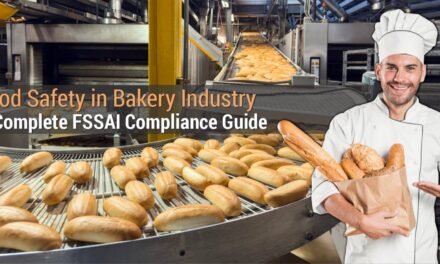The purpose of this article is to explain legitimate interest of Food Business Operators (FBOs) under FSSAI Act, and prepare them throughout the journey from FSSAI registration, inspections, sampling, food analyst reports, legal notices, penalties, and appeal, writes Vijay Sardana, Advocate, Delhi High Court, a well-known food and dairy industry expert.
How FBOs can protect their legitimate rights under FSSAI Act 2006?
Food Safety and Standards Act 2006 is an Act to consolidate the laws relating to food and to establish the Food Safety and Standards Authority of India (FSSAI) for laying down science-based standards for articles of food and to regulate their manufacture, storage, distribution, sale, and import, to ensure availability of safe and wholesome food for human consumption and for matters connected therewith or incidental thereto. You can read more about the FSSAI Act and its framework here
The Safety and Standards Act 2006 under Section 26, authorities that food safety officer, the new name for old food inspectors, to visit the food business operator to check the provisions of the Food Safety and Standards Authority of India (FSSAI) are implemented or not. While the purpose of these visits is to uphold food safety, concerns about adulterated and substandard food products persist in the market, as noted in this article.
If food inspectors are doing their job right and food business operators are operating with honesty, and as per the FSSAI Act, then why the market is full of adulterated and substandard products. FBOs of unsafe and adulterated foods & drugs and inspectors and analysts approving the same for sale to consumers are of the same mindset as terrorists, these people are hurting and damaging the society for their gains.
ALSO READ:
- Top 10 Dairy Companies in India
- India’s First Camel Milk Plant Strengthens Farmer Incomes
- Riddhi Siddhi Gluco Biols Signs APA for Cargill India’s Davangere Starch Business
- Chemco Group Opens Food-Grade rPET Recycling Plant in Gujarat
- All India Cashew Association Flags Surge in Illegal Cashew Kernel Imports
A visit from the food safety officer/inspector
A visit from the food safety officer/inspector to any food and drug establishment can be stressful even if you stay on top of health concerns by following a proactive food safety plan and scheduling regular cleanings.
Key areas inspectors focus on during visits:
- Food condition: Ensuring food is stored properly and is unadulterated.
- Hand-washing facilities: Adequate hand-washing sinks, soap, and paper towels are critical.
- Toxic substances: Proper labeling and storage of chemicals to prevent contamination.
- Pest control: Premises must be free from rodents, insects, and other pests.
- Worker hygiene: Ensuring personal cleanliness and proper facilities for workers.
Read about best practices for food safety compliance in this resource
If the food safety officer/inspector comes for inspection, here are some tips that may help you in visiting as smooth and productive as possible. The FSSAI Act also encourages food safety officers to advise food business operators on how to improve the hygienic condition in the establishment. You may ask the same to visit food safety officers.
1. Remember that you are responsible for safe food, like visiting inspectors, hence on the same team to ensure food safety:
It can sometimes seem like food managers and health inspectors have an adversarial relationship, but the truth is that you are working towards the same goal i.e. to ensure safe food to consumers. You both want to create a safe and healthy environment where consumers are protected and can confidently enjoy your food and beverages.
Don’t think about the visit as an inconvenience and you might gain some new and helpful information that you can use to improve your processes. To ensure improvement in performance and relationship both sides must respect each other and assist in improvement in food safety status. The bigger question is is this the intention on both sides, if yes, the relation will be smooth and healthy.
2. What food safety officer/health inspector may be looking during the inspection?
The most common observation where inspectors will focus on the visible signs of non-compliance so that they can put you under pressure and use their power given under the FSSAI Act.
According to my experience, you must keep the following points in mind and focus on addressing the same.
Food in good condition, safe and unadulterated – This violation occurs when food is left out or stored in unsafe areas e.g., near cleaning supplies, in an open area, or a restroom. Ice crystals and dust on the cutting table surface, on utensils and cutting tools, are forming on food due to improper storage, defrosting and refreezing procedures.
Adequate hand-washing facilities supplied and accessible – This could also be a major violation depending on how many violations occur. Examples: Lack of hot water, soap, and/or paper towels; a transit cabinet placed in front of the sink, inhibiting access to the sink; missing hand sinks; and not enough sinks in a workspace, absence of workers change room and dirty toilets of the workers, etc.
Toxic substances properly used, identified, and stored – Examples: When caps fall off chemical containers, when cleaning supplies are transferred out of their original containers into spray bottles and are not relabeled, and when chemicals are stored near food products, when packaging material is not properly staked and labeled, etc.
No rodents, insects, birds, or animals – It is a major violation when you see filth flies or one live cockroach, etc. This violation can close a food factory or any restaurant down if there is an infestation. Keeping your work floor and drains, and corners clean helps to prevent pests, and keeping your doors shut prevents them from flying in.
Personal hygiene of the Workers – This violation can close a food factory or any restaurant down.
Pollution and filth in and around food establishment – This violation can close a food factory or any restaurant down if there is an infestation or off-odour.
While being inspected, it’s prudent to follow the inspector so you can see any violations first-hand – also it is important to ask questions to understand any violations that may arise. This allows you to eliminate these risks in the future.
You should use your smartphones to take photographs of the violations so that the same can be addressed at the earliest.
3. Don’t give chance to harasses you – Be polite and professional.
During the inspection process, you may find that you disagree with some of the food inspector’s conclusions. Angrily confronting them and questioning how well they are performing their job is not the way to handle these situations. Please understand they have power under the law to charge you and we all know that this power is often misused by the person who draws power from the FSSAI Act. So why give them a chance to act against you. Remain calm and collected. Remember that they are trying to do their job and that inspections can be somewhat subjective.
If you would like to dispute an item on the inspection report, be sure to take a professional and non-confrontational approach. A little respect can go along way and you might be able to come to a mutual agreement about the problem and solve the issue.
4. Demonstrate a willingness to immediately fix any problems.
Repeated violations could be a sign that your employees aren’t following the standards that you set forward or specified by the law and it is time to tighten food safety practices. You can help your case by showing the inspector your plan for improvement and letting them know that you acknowledge the problem and are already on the road to making necessary corrections.
5. Update yourself, Be proactive and get involved.
Please read the FSSAI Act and notification issued by the relevant departments. You understand the law and rules will help you in better conversation. From my own experience, I can say that the biggest problem is that most food business operators do not have information about their compliance requirements.
Please take advantage of meetings and discussions taking place in your locality on the subject. This will allow you to have some say in regulations and work directly with food and health inspectors in a different capacity. The more you know about recent and proposed changes to health and food safety rules, the better you will be able to adapt and handle the inspections.
For updates on the FSSAI guidelines, visit this page
6. Prepare a logical food safety plan and share your plans.
As new rules and regulations are rolled out, take the time to develop your food safety plan accordingly and share your adjusted plans with your food inspector. This free exchange of ideas will help everyone learn and improve. The inspector learns about some strategies that you have successfully implemented and been able to share those with other food business operators who are looking for solutions. In the same way, the food and health inspectors can provide you with a helpful feedback that will make your life easier and products safer.
7. Have the food safety officer share their results with your employees
Ultimately, food safety comes down to a well-trained staff who takes pride in their work and wants to create a safe and delicious product. Hopefully, they want to learn more about where there are places for improvement and hear constructive suggestions from the food inspectors. Involve them in the process to help clarify where changes need to be made by having them speak directly with the food inspector.
Food and Health Inspection
More than anything, you should be prepared for a food and health inspector’s visit by always practicing good food safety and keeping your food manufacturing and food preparation locations in hygienic conditions. If you actively do the work throughout the year, not only will you protect your customers, you will also avoid having a stress-filled visit from the food and health inspectors. Please also note that violation of the laws could result in regulatory action including penalties or may lead to complete shut-down. Learn more about strategies to optimize food safety during inspections here.
When millions of small, medium and large companies around the world can develop and use proper food safety plan, you can also do the same. I will advise that have a food safety plan in place and make sure that your employees are aware of and follow protocols as mentioned in your plan and defined in standard operating procedure.
What next:
I know you all must be saying this is an ideal situation where food inspectors can go without harassing us or without demanding a bribe or some favor. I understand your concerns, let us discuss the same how to handle these challenging situations in coming articles.
Meanwhile, you may send your queries, questions, and feedback to editor@pfionline.com or technolegalsardana@gmail.com
‘Processed Food Industry’: The Voice of Food Processing Industry
Processed Food Industry (PFI) is a premier English-language monthly B2B publication (ISSN 09721649) headquartered in New Delhi, catering to the vibrant and ever-evolving food processing industry. While we don’t claim to be the largest or most widely read, our proud legacy of over 27 years—publishing continuously since 1997—has earned us the trust of industry professionals as a reliable source of insights and information.
If your goal is to tap into the booming Indian and South Asian markets to promote your equipment, technology, software, or consumables, PFI is your strategic partner. With our hybrid approach across print, web, and social media, we help you establish strong brand recognition rooted in market relevance. Backed by a team of top-tier technical writers, we’re ready to work closely with you and your customers to craft compelling content that drives results.
India and South Asia’s food industry is expanding rapidly, driven by efficiency and cutting-edge innovations. Don’t miss the opportunity to elevate your brand and engage with this dynamic market. Get our 2025 media kit to fine-tune your marketing strategy, increase your visibility, and convert potential customers into valuable conversations. Additionally, ask for a sample copy of our monthly magazine and experience the quality and relevance we deliver.
Let us help you define your role in the future of the food processing industry.

Have a news or topic to share with industry? Write to us editorial@pfionline.com
















